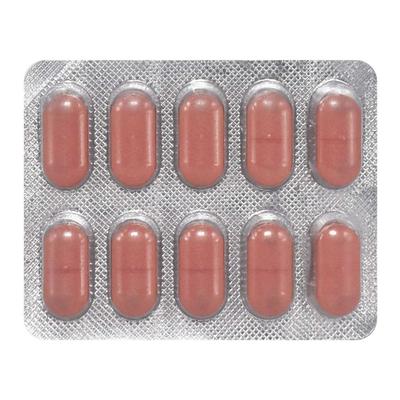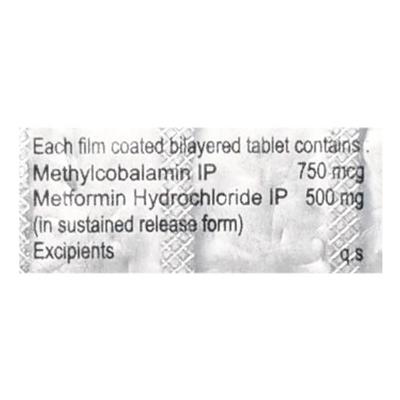

Netmeds First Membership
Quick Links
Introduction About REJUMET TABLET
REJUMET TABLET is a combination of Metformin and Methylcobalamin, which belongs to the group of medicines called Antidiabetic agents. It is used in the management of diabetes mellitus.
During management with REJUMET TABLET, your doctor will conduct a blood test to check your kidney function.
REJUMET TABLET is not recommended for use if you have severely reduced kidney function, liver disease, acute heart failure, a recent history of heart attack, severe problems with blood circulation (such as shock) or breathing difficulties. Consult your doctor before taking it.
REJUMET TABLET is not recommended for use during pregnancy or in breastfeeding women, as it may pass through the breast milk. Consult your doctor before taking it.
The most common side effects of taking REJUMET TABLET are nausea, vomiting, diarrhea, abdominal pain, loss of appetite, and changes in taste. Consult your doctor if any of the side effects worsen.
Uses Of REJUMET TABLET
- To manage type II diabetes mellitus
How REJUMET TABLET Works
REJUMET TABLET effectively controls blood glucose levels, where metformin works by decreasing the production of glucose in the liver, decreasing the intestinal absorption of glucose, increasing insulin sensitivity, and allowing better glucose uptake and utilization by the body. Methylcobalamin helps in the synthesis of the myelin sheath, which forms a protective covering over the nerves and also helps regenerate injured nerves. It plays an important role in red blood cell formation and brain and nervous system functions.
How to use REJUMET TABLET
Take REJUMET TABLET, preferably with meals or as advised by your physician. Swallow the medicine with a glass of water. Do not crush or chew the medicine. Your doctor will decide the correct dose and duration of therapy for you depending on your age, body weight, and disease condition.
Side Effects Of REJUMET TABLET
Common
- nausea, vomiting, diarrhea, abdominal pain, and loss of appetite
- changes in taste
Stop taking REJUMET TABLET and consult your doctor immediately if you experience any of the following side effects:
- The symptoms of lactic acidosis are vomiting, abdominal pain, muscle cramps, a general feeling of not being well with severe tiredness, difficulty breathing, reduced body temperature, and a slow heartbeat
How To Manage Side Effects
Diarrhea
Drink lots of fluids, such as water or fruit juices, to keep yourself hydrated. Do not take any medicine on your own to manage diarrhea. Contact your doctor if your diarrhea does not improve.
Nausea And Vomiting
Take REJUMET TABLET with a meal. Stick to simple meals. Avoid eating oily or spicy food. Contact your doctor if your nausea and vomiting do not improve.
Stomach Pain
Rest and relax. Eat and drink slowly or try to have smaller and more frequent meals. Keep a heating pad on your stomach. Do not self-manage on your own, consult your doctor if the symptom does not improve on its own.
Warning & Precautions
Pregnancy
ContraindicatedREJUMET TABLET is not recommended for use during pregnancy. Consult your doctor before taking it.
Breastfeeding
ContraindicatedREJUMET TABLET is not recommended for use in breastfeeding women as it may pass through the breast milk. Consult your doctor before taking it.
Driving and Using Machines
Use with CautionDo not drive or operate any machinery if you have weakness, dizziness, increased sweating, a fast heartbeat, visual problems, or difficulty in concentration after taking REJUMET TABLET.
Alcohol
Consult your doctorAvoid excessive consumption of alcohol, as it may increase the risk of lactic acidosis.
Kidney
ContraindicatedREJUMET TABLET is not recommended for use if you have severely reduced kidney function. Consult your doctor before taking it.
Liver
ContraindicatedREJUMET TABLET is not recommended for use if you have liver disease. Consult your doctor before taking it.
Allergy
ContraindicatedDo not take REJUMET TABLET if you are allergic to Metformin, Methylcobalamin, or any of the other ingredients in this medicine.
Heart Disease
ContraindicatedREJUMET TABLET is not recommended for use if you are managed for acute heart failure, a recent history of heart attack, or severe problems with blood circulation (such as shock) or have breathing difficulties. Consult your doctor before taking it.
Use In Pediatrics
Consult your doctorThere is no information on the use of REJUMET TABLET in children. Consult your doctor for advice.
Use In Geriatrics
Use with CautionREJUMET TABLET should be used with caution only in elderly patients aged 65 years and older. Consult your doctor before taking it.
Others
REJUMET TABLET is not recommended for use if you:
- have uncontrolled diabetes mellitus with lactic acidosis, or ketoacidosis
- have dehydration due to severe diarrhea and vomiting
- have severe infections in the lungs and kidneys
- are scheduled for lab testing
- are planned for surgery
Interactions
A. Drug-Drug interactions:
Before taking REJUMET TABLET, inform your doctor if you are taking any of the following medicines, such as:
- sulphonylureas, insulin, and meglitinides (other medicines used to manage diabetes) Ex. glimepiride, repaglinide
- medicines that increase urine production (diuretics) Ex. chlorothiazide
- beta-2 agonists such as salbutamol or terbutaline (used to manage asthma)
- corticosteroids (used to manage severe inflammation of the skin or asthma), Ex. dexamethasone
- verapamil (medicine used to manage blood pressure)
- rifampicin (a medicine used to manage tuberculosis)
- cimetidine (a medicine used to manage stomach problems)
- dolutegravir (a medicine used to manage viral infections)
- ranolazine (medicine used to manage chest pain)
- trimethoprim, neomycin, and aminosalicylic acid (medicine used to manage bacterial infections)
- vandetanib, crizotinib, and olaparib (medicine used to manage cancer)
- isavuconazole (a medicine used to manage fungal infections)
- medicines used to manage pain and inflammation (NSAIDs and COX-2-inhibitors, such as ibuprofen and celecoxib)
- certain medicines for the management of high blood pressure (ACE inhibitors and angiotensin II receptor antagonists) Ex. enalapril, candesartan
- colchicine (used to manage gout)
- oral contraceptives (medicines used to inhibit fertilization) Ex. levonorgestrel
Overdosage:
If you or anyone else accidentally took more REJUMET TABLET, consult your doctor immediately or visit the nearby hospital. Overdosage may cause lactic acidosis, and symptoms include vomiting, abdominal pain with muscle cramps, a general feeling of not being well with severe tiredness, and difficulty in breathing. Further symptoms include reduced body temperature and heartbeat.
Synopsis
| Drug | : | Metformin and Methylcobalamin |
| Pharmacological Category | : | Biguanides, Vitamins |
| Therapeutic Indication | : | Type II Diabetes mellitus |
| Dosage Forms | : | Tablet |
More Information
- Keep REJUMET TABLET out of the sight and reach of children
- Store REJUMET TABLET below 30°C
FAQs About REJUMET TABLET
Q: What if I forget to take REJUMET TABLET?
A: If you forgot to take a dose of REJUMET TABLET, take it as soon as you remember. However, if it is time for the next dose of REJUMET TABLET, skip the missed dose and take the next one regularly. Do not take a double dose of REJUMET TABLET to compensate for the missed ones.
Q: Is REJUMET TABLET safe in pregnancy?
A: REJUMET TABLET is not recommended for use during pregnancy. Inform your doctor if you are pregnant or planning to become pregnant before taking this medication.
Q: Who should not take REJUMET TABLET?
A: REJUMET TABLET is not recommended for use if you have severely reduced kidney function, liver disease, acute heart failure or a recent history of heart attack, or severe problems with blood circulation (such as shock) or have breathing difficulties, have uncontrolled diabetes mellitus with lactic acidosis or ketoacidosis, have dehydration due to severe diarrhea and vomiting, or have severe infections in the lungs and kidneys. Consult your doctor before taking it.
Q: What are the side effects of taking REJUMET TABLET?
A: The most common side effects of taking REJUMET TABLET are nausea, vomiting, diarrhea, abdominal pain, loss of appetite, and changes in taste. Consult your doctor if any of the side effects worsen.
Q: What should I avoid while taking REJUMET TABLET?
A: Avoid excessive consumption of alcohol while taking REJUMET TABLET, as it may increase the risk of lactic acidosis.
References
1. KD. Tripathi. Insulin, Oral Antidiabetic Drugs and Glucagon. Essentials of medical pharmacology. Eight edition. 2019. Page – 299.
2. Brown & Burk UK Ltd. Electronic Medicines Compendium (EMC) [Revised in May 2022] [Accessed on 2nd January 2024] https://www.medicines.org.uk/emc/files/pil.10759.pdf
3. Getz Pharma (Pvt.) Ltd. Methylcobalamin. [Accessed on 2nd January 2024] https://getzpharma.com/wp-content/uploads/2016/08/Nervon-Range-Leaflet-Export-GA.pdf
4. Metformin and Methylcobalamin. Fourts India laboratories Pvt Ltd. [Accessed on 2nd January 2024] https://www.fourrts.com/rejumet-1000/
5. Drug bank. Metformin. [Accessed on 30th December 2023] https://go.drugbank.com/drugs/DB00331
Useful Diagnostic Tests
- HbA1C, Also known as Glycated Hemoglobin, Glycosylated Hemoglobin
- Blood Glucose Fasting (FBS)
- Random Blood Sugar (RBS)
- Post Prandial Blood Sugar (PPBS)
- Insulin-Fasting
- Insulin Postprandial (PP)
- Vital Diabetes Care
- Extended Diabetes Care
- Advance Diabetes Care
- Comprehensive Diabetes Care









